what digital marketing is ?
Digital marketing is a broad term that encompasses all marketing efforts leveraging electronic devices and the internet. Businesses employ digital channels such as search engines, social media, email, and websites to connect with current and prospective customers. As the world becomes increasingly digital, the importance of digital marketing has surged, enabling companies to reach a vast audience, target specific demographics, and measure the effectiveness of their marketing campaigns in real time. This article delves into various facets of digital marketing, including website development, infographics, filmmaking, application creation, advertising, and SEO, explaining how each contributes to a successful digital marketing strategy.
Website Development in digital marketing
Website development is the foundation of digital marketing. A well-designed and functional website serves as the primary touchpoint for customers, where they can learn about a company’s products or services, make purchases, and contact customer support. Effective website development involves several key elements:
- User Experience (UX) Design: Ensures the website is easy to navigate and provides a seamless experience for visitors.
- Responsive Design: Guarantees the website looks and works well on all devices, including desktops, tablets, and smartphones.
- Content Management Systems (CMS): Platforms like WordPress or Joomla allow businesses to easily update and manage website content.
- E-commerce Integration: For businesses selling products online, integrating secure and user-friendly e-commerce solutions is essential.
A robust website not only enhances credibility but also serves as a hub for all digital marketing activities, including content marketing, social media marketing, and email campaigns.
Infographics
Infographics are visual representations of information, data, or knowledge intended to present complex information quickly and clearly. They are an excellent tool in digital marketing for several reasons:
- Simplification of Information: Infographics can break down complex data into easily digestible visuals.
- Engagement: Visual content is more engaging than plain text, making infographics highly shareable on social media platforms.
- SEO Benefits: Infographics can drive traffic to a website when optimized with relevant keywords and shared widely.
Creating effective infographics involves a balance of design and data accuracy. Tools like Canva, Piktochart, and Adobe Illustrator can help marketers create professional and visually appealing infographics.
Filmmaker
Filmmaking in digital marketing refers to the creation of video content used to promote products, services, or brands. Videos are powerful tools in digital marketing for several reasons:
- Engagement: Videos are highly engaging and can capture attention more effectively than text or images.
- Storytelling: Videos allow businesses to tell compelling stories that resonate with their audience.
- Versatility: Video content can be used across multiple platforms, including social media, websites, and email campaigns.
Types of video content include explainer videos, product demonstrations, customer testimonials, and behind-the-scenes footage. With the rise of platforms like YouTube, TikTok, and Instagram, video content has become a crucial component of any digital marketing strategy.
Application Creation
Application creation, or app development, involves designing and building mobile applications that offer additional functionality or content to users. In digital marketing, apps provide numerous benefits:
- Customer Engagement: Apps offer a direct channel to engage with customers, provide personalized experiences, and foster loyalty.
- Push Notifications: Marketers can send targeted messages directly to users’ mobile devices, promoting new products, special offers, or important updates.
- Data Collection: Apps can collect valuable data on user behavior and preferences, helping businesses tailor their marketing strategies.
Developing a successful app requires careful planning, user-centric design, and ongoing updates to maintain relevance and functionality. Whether it’s an e-commerce app, a loyalty program app, or a content-based app, having a mobile presence can significantly enhance a company’s digital marketing efforts.
Advertising
Digital advertising encompasses a variety of online platforms and methods to promote products or services. Key types of digital advertising include:
- Search Engine Advertising (SEA): Platforms like Google Ads allow businesses to display ads on search engine results pages (SERPs) based on specific keywords.
- Social Media Advertising: Platforms such as Facebook, Instagram, LinkedIn, and Twitter offer targeted advertising options to reach specific demographics.
- Display Advertising: Banner ads placed on relevant websites to drive traffic or awareness.
- Pay-Per-Click (PPC): An advertising model where businesses pay a fee each time their ad is clicked, driving traffic to their websites.
Effective digital advertising requires a well-defined target audience, compelling ad creatives, and continuous monitoring and optimization to ensure a positive return on investment (ROI).
SEO (Search Engine Optimization)
SEO is the process of optimizing a website to rank higher in search engine results pages, thereby increasing organic (non-paid) traffic. Key components of SEO include:
- Keyword Research: Identifying the terms and phrases that potential customers are searching for.
- On-Page SEO: Optimizing website content, meta tags, images, and internal links to improve relevance and usability.
- Off-Page SEO: Building backlinks from reputable websites to increase domain authority and trustworthiness.
- Technical SEO: Ensuring the website’s technical aspects, such as page speed, mobile-friendliness, and site architecture, are optimized for search engines.
SEO is a long-term strategy that requires ongoing effort and adjustment as search engine algorithms and market conditions change. A strong SEO strategy can significantly enhance visibility, drive traffic, and ultimately lead to higher conversions.
Conclusion
Digital marketing is an ever-evolving field that leverages various tools and strategies to reach and engage customers online. From website development to SEO, each element plays a crucial role in building a comprehensive and effective digital marketing strategy. By understanding and implementing these components, businesses can enhance their online presence, engage with their audience more effectively, and drive growth in the digital age.
